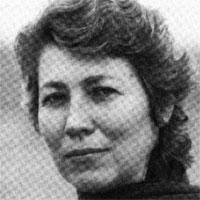Without Warning
Poems by Patricia Donegan.
Foreword by Allen Ginsberg.
Parallax Press: Berkeley, 1991.
99 pp. $8.00 (paperback).

Patricia Donegan writes along one of poetry’s borders: simplicity. A “simple” poem can be overlooked or dismissed easily, but the reward for writing this way is penetrating clarity. Donegan’s poems don’t attempt to envelope the reader in atmosphere. They approach and enter like acupuncture needles.
I sit by my window eating an orange
you enter & undress me
without a word.
Wait a minute. Simplicity is one thing; this is nakedness. But Donegan has the courage to write unadorned, to “lay bare” her mind for us, and we read about bare bodies in the bloom of youth, in maturity, and in decay. Nakedness, for Donegan, is the ultimate simplicity.
When a poet chooses direct address and straightforwardness, two criteria apply: first, that the directness be a distillation of experience rather than technique; second, that the insight be absolutely genuine, as Robert Creeley asks, “Was that a real poem, or did you just make it up yourself?”
With regard to the first question, Patricia Donegan has worked to sharpen her writing style for decades. She spent eight years living and studying in East Asia, including one year as an apprentice with a haiku master in Japan. For many years she was a teacher at Naropa Institute in Boulder, Colorado, along with many of the best-known writers of our time—Ginsberg, Waldman, Creeley, Berrigan, Snyder, Burroughs, Corso, di Prima, McClure, and others.
Her Buddhist teacher at Naropa, Chogyam Trungpa Rinpoche, also loved and wrote poetry. On many occasions, Donegan was asked—commanded practically—to compose and recite spontaneously in front of large audiences. Though her work is remarkably fresh, she is no primitive.
A peach pit in the ashtray
a note on the table—
“I had to go, sorry.”
Even a grumpy William Carlos Williams could have appreciated this poignant verse, which is at the same time a skillful homage to his plums/refrigerator song.
The second criterion—that the poem ring true—is obviously subjective, but Donegan’s poems stake out a territory of such honesty and intimacy that authenticity is not in question. For example, this poem was written at the grave of a Tang-dynasty Chinese poet.
Oh, Tu Fu, / didn’t want to see you like
this,
you look horrible, embarrassing, tiny,
shrunken
like nothing very human
nothing like a poet
should, yet like everything
that’s hidden behind the
skin, beyond the mirror,
to the place of mystery, down
to the bone, down to the very poem
you wrote, about eternally
drinking wine in the face of death.
Thank you for subscribing to Tricycle! As a nonprofit, we depend on readers like you to keep Buddhist teachings and practices widely available.